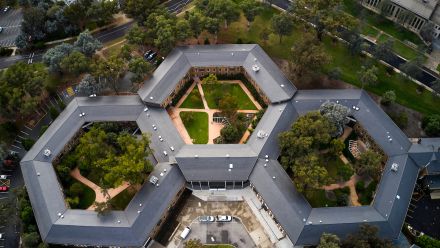Providing more detail on our financial position
Message to staff and students from the Vice-Chancellor on 9 June 2020
To the ANU Community,
Following my previous message and the forum that more than 1,100 of you attended, we have received more than 150 emails with ideas, comments and suggestions to address the University's financial situation. The COVID-19 pandemic has been hard on everyone, some much more than others, but I thank you for your resilience, your generosity of spirit, your creativity, and your commitment to our community to address this issue as one.
We have been working hard to gather the information to help answer some of your questions and provide as much clarity and transparency around our situation as I meaningfully can. In what comes below, we lay out our financial situation so that we all know the same things. The high-level information is more or less the same that my team and Council are working to.
I wished there was a straightforward solution to address our current budget shortfalls and future uncertainties. But our University, along with the rest of the sector, will for this year and most likely for at least the next two years, need to face difficult decisions as we face working with substantially fewer resources than we are used to. So I want to lay out how we got here, and where we can expect to be by years' end.
At the outset of the COVID-19 pandemic in January, when many of our international students were unable to come to campus to begin their studies, the University stood up the Critical Incident Management Team to develop guiding principles for how we would manage the unfolding crisis. Those principles were focussed on a people-first approach, which saw us introduce a range of measures to support our community, and to mitigate the disruption to our work, our students' studies and our lives generally. Flexibility and generosity, have been, and will continue to be, at the core of how we respond. For example, we recognised the impact of this disruption across all areas of life, and allowed, where necessary, staff to work 70 per cent of a full time load while receiving full pay, while ensuring that casual staff were paid their rostered hours for the semester one 2020.
Unforeseen costs
At the beginning of the year, the University was in a strong financial position. We had submitted to Council a budget that would ensure we remained in a strong financial position at the end of 2020, while utilising some accumulated cash reserves on our capital program and other strategic initiatives.
In January we were forced to close the campus as smoke inundated the city, and later that month a supercell hailstorm caused extensive damage and disrupted the work of the University. These two events meant immediate unforeseen costs of $6.7 million and damage to buildings measured in the hundreds of millions of dollars.
The global pandemic saw travel restrictions affect thousands of international and domestic ANU students. To support affected students, the University funded a number of support measures and implemented flexible approaches to remote learning. These unforeseen circumstances have cost $68 million, as set out below:
- Our financial support measures for students have totalled $60 million and include: emergency funding to student associations, travel bursaries for students, covering the early exit of accommodation contracts, extensions of HDR scholarships and allowing international students affected by the travel ban to withdraw without financial penalty up until 8 June 2020. This was to ensure our student community - many in vulnerable financial positions - was supported and cared for.
- In addition, we also incurred costs of $8 million associated with the transition to remote working and learning. These costs included software to support remote teaching and working, contracts to ensure staff and student welfare support, increased cleaning and additional staff support for repatriation and wellbeing.
Concurrent with these unforeseen expenses, the University will earn less income than anticipated - based on current projections and our best assessments of next semester, we expect a reduction to our budget of $125 million in tuition fees and $25 million in other revenue such as commercial activities on campus.
Adding this all together. Our best guess, as of 9 June, is that we face a $225 million shortfall in 2020 relative to our budget.
Immediate savings
The University spends approximately $100 million each month on salary and operating costs. Also, the University has a very large capital works program funded in significant part by our accumulated cash reserves. It is easy to be critical, after the fact, of a capital program, but the University infrastructure, as deemed both by myself, previous Vice-Chancellors, and the ANU Council, was badly in need of an upgrade.
It was critical that we took some immediate measures to ensure our financial health in semester one. Restricting travel is saving the University $34 million as we have forecast that travel will be minimal this year. Where possible, we have deferred capital works, which reduces our planned outlays by $100 million. We made the decision to proceed with some ongoing capital works, because delaying them is more expensive due to contractual obligations and the cost of partially completed buildings. While I can't put an exact figure on it, the pause on recruitment has also helped reduce our costs. These measures have helped our cash position in the short term.
Where are we now?
Our cash flow forecasting showed that even after the immediate measures taken, the University would be running down our reserves by the end of 2020 to an unacceptably low level. Adding to our uncertainty, student income remains highly uncertain for semester two, and will only become clearer after the second semester census date, where we can see the full picture of our student enrolments.
With respect to our balance sheet, in addition to building and other non-liquid assets, the University holds superannuation funds for past staff, and an endowment which is legally required to be spent for the purposes of the individual gifts that make it up. Beyond these assets, the ANU Council has determined the University needs to retain $250 million of cash, or just under three months' operational expenses, in reserve by the end of the year. This is to ensure we are able to meet our financial obligations, particularly as 2021 and 2022 are also uncertain and we need to be in a position to deal with future challenges.
To achieve this, the University will do two things for the remainder of 2020.
- We will fund $150 million of our current capital expenditure from borrowings. The decision on how much to borrow took into consideration many factors including our borrowing limits, ensuring we have borrowing facilities available to fund revenue generating activities as needed, the cost of borrowing and the financial pressure placed on future periods with repayments.
- We will reduce our operational cash outflows by $100 million, which includes expenditure savings, deferrals and improvements to our revenue.
Reducing our expenditure will be difficult - and it is something everyone will need to contribute to. It will involve forgoing some of the conveniences we have enjoyed in recent years, when the University's financial position was very strong, and considering structural changes to parts of ANU. It will also involve reducing our salary bill - this means making hard decisions about fixed term contracts, reducing our use of casual staff, and pursuing voluntary separations. Voluntary separations will need to be carefully calibrated to ensure they meet the obligations and best interests of our staff members, their teams and the University, but there are generous protections in place in the Enterprise Agreement for staff who do agree to a separation.
There are some simple things we can do immediately to improve our cash outflows this year and beyond, including reconsidering non-essential spending and continuing the current pause on recruitment. Using up long service leave and annual leave will not provide us with a cash improvement this year but it will help us strengthen our financial position by reducing expenses - we have accrued leave entitlements on our balance sheet which will be used to fund the leave taken.
I have asked for people's views on deferring the pay rise scheduled for July 2020. The community has been amazingly generous in their offers of support. By and large I have been told people want to defer their pay rise, although I note concern for our lowest paid members of staff. Many senior staff have offered to forego their salary increase to allow their junior colleagues to keep theirs - this is the embodiment of ANU spirit at its best - although this is not easily feasible in the short term.
Any change to the scheduled pay rise would require a formal vote of staff and a majority of staff will need to agree. We will outline the process to vote on this decision later today. I believe, all things considered, this is a sensible action to take. As part of our current Enterprise bargaining agreement, we have deliberately increased the salary of our lowest paid workers relative to the highest over the past three years, and 2020 is set to have the lowest CPI increase in recent history. But I recognise that the deferment is not pain free. Ultimately the choice will be yours.
On this issue - how you vote will be confidential and it's important that you make the best decision for your circumstances. To help make your decision, I will simply give you the facts, which are:
- Deferring the July 2020 to July 2021 pay rise will save the University $6.75 million for six months and $13.5 million for 12 months.
- Should the majority staff vote in favour of deferring the pay rise, your wage will remain the same as it is now, with the two 2 per cent increases scheduled for July 2020 and 2021, deferred for 12 months each.
- This is a decision for staff, not the University management or other stakeholders.
What next?
I can't tell you exactly what next year's financial situation will be, but I can tell you that I will keep you informed of any decisions we make, and provide you with opportunities to provide feedback where appropriate.
We will continue to consult with you all on other savings measures through June and July. I can imagine some of these will be about improving our financial decision making and some will be about university wide initiatives to reduce our expenditure. I know your College Deans, School and Research Institute Directors, and Executive and professional staff leaders will be discussing local decisions with you directly. If you have questions, please speak with your supervisor in the first instance.
Because we had made strategic decisions about the size of the organisation we want to be, we were already pursuing a revenue diversification strategy looking at philanthropic funding and research funding outside of ARC and NHMRC. This work will take greater priority over the coming weeks and months. I think it worth noting that while we had not predicted a global pandemic, our strategy to become a smaller, more sustainable organisation has prepared us better than most other universities in Australia.
Building our revenue will be among the most important areas to meet this financial challenge. With the implementation of remote learning, we have seen higher than expected retention from our international students. Our focus moving forward will be to retain and strengthen engagement with our international students, and to innovate new ways to keep them engaged until they can travel to Australia.
In Colleges, with support from central service divisions, we are looking at new joint or dual degree programs that could be delivered overseas. This will be a longer transition but will ensure we can continue to recruit the best students from around the world - even if they can't physically attend campus. We do not know what the future of travel looks like, or when international borders will open so we need to be flexible about providing access to an ANU education - without being on campus.
Here in Australia, encouragingly, demand for domestic undergraduate enrolments has remained strong. This will support our plans for a truly representative student body, and ensure access to students from across our nation. Earlier this year we changed our admissions policy to make offers to domestic students based on their Year 11 results and we have been really pleased with the number of applications received since we announced that policy. Ensuring certainty for our future students is important - not just for their education, but for us to understand the demands on our teaching.
We also don't know which travel restrictions will remain in place - domestically or internationally - or how that will affect our offshore and domestic students.
Despite all this uncertainty, a few things remain unchanged:
- The ANU experience is more than just classes and exams.
- Our students come to ANU to learn, not just from the world's best teachers, but from their peers who come from around the world. While the education quality of remote learning has been exemplary, we hope to see our students back on campus as soon as possible.
- Our mission to advance Australia through excellent research and public policy is unwavering. And our researchers have been steadfastly focussed on the future of our nation and our region through their work to lead Australia out of the pandemic.
- The whole ANU community has shown its strength and resolve through adversity, as we always do.
I thank you all for your patience, your willingness to be part of the strategy to ensure our financial health and your commitment to the welfare of your colleagues and this great institution.
Brian


